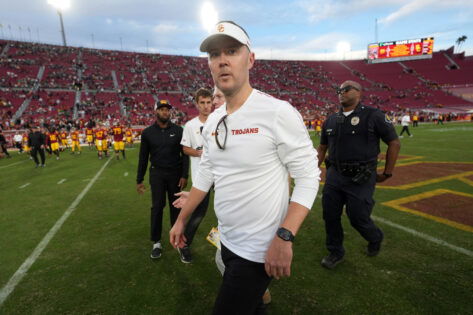The USC-Notre Dame football rivalry is one of college football’s most storied and intense matchups. It dates back nearly a century to 1926. With 24 national championships and 15 Heisman Trophies between them, they play for a deep legacy. That is steeped in tradition, history, and pride, and not just bragging rights. But as much as this rivalry means to fans and players alike, it hasn’t been immune to modern college football’s changing landscape. And especially the College Football Playoff (CFP) era.
The CFP system is designed to crown the best team nationally. Now, that has raised real concerns about how rivalry games like USC vs. Notre Dame affect playoff chances. Both Lincoln Riley and Marcus Freeman worry that a tough loss in such a high-profile game can unfairly damage their path to the playoffs. The USC head coach has been vocal about wanting a fairer system that respects historic rivalries without putting teams at a disadvantage.
On August 8th, Riley joined the ESPN LA conversation to shed light on the matter. When asked whether the committee would reach a point where they would consider the context of the losses, the Trojans’ HC said, “It’s just at the end of the day, are you going to have a human that’s just going to sit there and is going to put in, a 9-3 team over an 11-1 team?” Riley asked.
He openly questions if this rivalry still makes sense in the current CFP era, where every game’s impact on playoff chances looms large. “As a human, you can always fall back on, well, this team won 11 and this team won nine. And it’s an impossible position to put these people in. And that’s why we’ve all been such an advocate to get more just automatic qualifying spots. Let these conferences decide it however the he-l they want to decide it,” Riley added.
“And then be one of the best teams in your conference, and then you go represent your conference in the playoffs. And then it does preserve it; it doesn’t put us in a tough position like we are right now.” Riley’s core demand from the CFP committee isn’t just about easy access to the playoff; it’s about fairness in how they evaluate teams. The CFP committee’s job is to pick and rank the “best” teams based on criteria like strength of schedule. Also, head-to-head results and other factors like injuries or unavailable key players. But at the end of the day, the win-loss record looms large, often overshadowing nuance. This means teams that take on tougher schedules. That includes historic rivalry games or competitive conferences, risking having that toughness penalized if they slip up even once.
The logical solution Riley and many others advocate is to increase the number of automatic qualifying spots in the playoff field. Teams would simply need to be among the best in their conference, then prove their worth in the playoff itself. This method preserves storied games like USC-Notre Dame and makes the playoff more straightforward and fair. In recent years, committees have controversially left undefeated teams from Power Five conferences out because their overall body of work didn’t “fit” the sometimes opaque standards. The story of Florida State’s shocking exclusion from the 2023 College Football Playoff (CFP) is one wild drama.
The Seminoles’ star quarterback Jordan Travis suffered a serious leg injury late in the season. And his backup got hurt too. So Florida State had to win crucial late games with its third-string QB. The CFP committee acknowledged that without Travis’s dynamic presence, Florida State’s offense was “a different team.” And that in turn has raised big doubts about how competitive they’d be in the playoffs. There were six to eight rounds of voting, through tense and complicated discussions. And they eventually selected Alabama over Florida State for the final playoff spot. Of course, we’re in a different era now. 12-team playoffs instead of 4-team playoffs. Even then, some SEC teams weren’t happy that their 9-3 records were held against them, and the committee went with an ACC team instead for the final spot.
Marcus Freeman’s mission to save the series
Marcus Freeman is making a passionate and clear plea to keep the historic USC-Notre Dame rivalry alive. Freeman has emphasized how much this game means not only to the two schools but to college football as a whole. Winning a rivalry game, in his words, can make the entire season feel like a success. While Freeman insists that continuing the series is non-negotiable from his side, he acknowledges the practical challenges.
Scheduling must work for both universities, and with USC now in the Big Ten while Notre Dame remains independent, aligning calendars and commitments is complex. This strong stance contrasts with USC coach Lincoln Riley’s more cautious approach. Riley has hinted at concerns about the rivalry’s impact on USC’s College Football Playoff chances under the current and potentially revamped playoff formats.
Lincoln Riley and athletic director Jennifer Cohen appear hesitant to commit long-term. Riley has hinted that USC’s move into the tougher Big Ten Conference and the looming expansion of the College Football Playoff to 16 teams complicate scheduling non-conference games like this classic rivalry. USC’s recent dropping of other major non-conference matchups has only fueled speculations. That deals with Riley trying to soften USC’s schedule to improve playoff chances.
The post Lincoln Riley Issues Strong Demand to CFP Committee as He Flips Script on USC-Notre Dame Rivalry appeared first on EssentiallySports.



